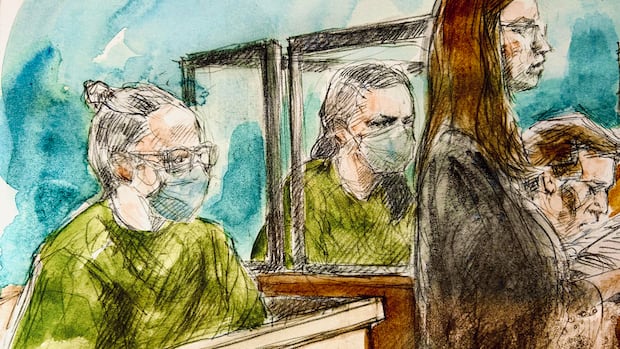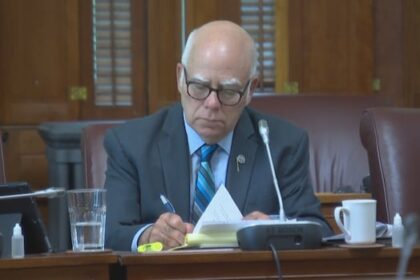HamiltonEight days before his death, L.L. was checked by his family doctor in Burlington, Ont. The 12-year-old weighed less than he did when he was six years old and had stopped growing, but the doctor didn’t send him to hospital. Boy’s family doctor grilled by defence lawyer during Hamber-Cooney trial in MiltonSamantha Beattie · CBC News · Posted: Oct 29, 2025 4:00 AM EDT | Last Updated: 6 hours agoListen to this articleEstimated 6 minutesBecky Hamber, left, and Brandy Cooney, centre, sit in separate boxes in the Milton, Ont., courtroom during their murder trial as assistant Crown attorney Monica MacKenzie questions a witness. (Pam Davies/CBC)WARNING: This story details allegations of child abuse.A 12-year-old boy who was severely malnourished and underweight was seen by his family doctor for an annual checkup eight days before he died while in the care of two Burlington, Ont., women. Dr. Graeme (Stephen) Duncan testified on Monday and Tuesday at the trial for Becky Hamber and Brandy Cooney, who have pleaded not guilty to the first-degree murder of the boy the couple had been trying to adopt.At the time of the appointment, on Dec. 13, 2022, the boy, known as L.L. as his identity is protected by a publication ban, had lost about 10 pounds in one year, weighed less than he did when he was six years old and had stopped growing.“He was quite interactive and normal in terms of responding to me verbally, politely,” Duncan told the judge-alone trial in Milton Superior Court. “But the physical exam was remarkable mostly because of his weight loss.” The family physician, who practises in Halton region and has 2,200 patients, said Hamber and Cooney had claimed L.L. had an eating disorder and was throwing up every day. Duncan had already sent a referral to an eating disorder clinic and was waiting for a response.Based on scans and tests sent to Duncan before the appointment, he would have known L.L. “was a ticking time bomb waiting to go off,” and could have “dropped” at any point with a cardiac occurrence that could’ve led to his death,” Monte McGregor, Hamber’s lawyer, said during cross-examination.L.L. had actually shrunk since his appointment with Duncan the year before, McGregor said. L.L. is seen here while in an in-patient mental health program in 2019 when he was eight years old. CBC has blurred his face to protect his identity, which is under a publication ban. (Ontario Superior Court in Milton)Doctor didn’t follow pediatric group’s guidelines, court toldDuncan admitted that during the checkup, he didn’t ask L.L. about his eating, examine him with his clothes off or take his blood pressure while he was lying down and standing up — all recommended by the Canadian Paediatric Society to determine the physical impacts of a patient’s malnutrition.Duncan also didn’t call an ambulance, even though L.L.’s weight suggested he was severely malnourished, or recommend that Hamber and Cooney take L.L. to the emergency department, the doctor confirmed during testimony. On Dec. 21, 2022, L.L. was found emaciated, soaking wet and unresponsive in the basement of Hamber’s and Cooney’s house. He was rushed to hospital and died soon after. A pathologist previously told the court he was not able to determine L.L.’s cause of death, but couldn’t rule out hypothermia or cardiac arrest linked to severe malnourishment.Hamber and Cooney were also in the process of adopting L.L.’s younger brother, J.L., whose identity is also protected under a publication ban. The two Indigenous boys were moved from a foster home in Ottawa to the women’s home in 2017. They remained wards of the Children’s Aid Society (CAS) of Ottawa, as the adoption was never finalized before L.L. died. The Halton CAS was in charge of supervising their day-to-day care.The women have also pleaded not guilty to confinement, assault with a weapon — mainly zip ties — and failing to provide the necessaries of life to J.L.Duncan was the boys’ family doctor from 2018 to 2022. He was aware of the many psychiatrists, mental health providers and pediatricians who’d assessed and treated L.L., as well as their findings, recommendations and medication prescriptions. Concerns raised over potential adoption In a striking 2019 letter to the Halton CAS’s director that was co-signed by Duncan and his health team’s lead physician, the doctors and clinic staff expressed their concerns about the adoption of J.L. and L.L. by Cooney and Hamber. The letter, read aloud in court by assistant Crown attorney Monica MacKenzie, said Cooney’s and Hamber’s parenting approach and “safety containment was more abusive than therapeutic,” including forcing the boys to sleep in tents, covering their rooms in tarps and zip tying them into their clothes.It also said the women were volatile and their emotions were dysregulated. Hamber, left, and Cooney, as seen on their wedding day, are accused of first-degree murder of the boy they were trying to adopt. (Becky Hamber/Facebook )“Despite multiple efforts, [Cooney and Hamber] were unwilling to work on goals to support the children at home, in the community and in school,” the letter said. Duncan told the defence he didn’t follow up about the letter as he felt the CAS was in the best position to address the concerns. But this was not the first or last warning childen’s aid would receive about Cooney and Hamber. Teachers, police and therapists also reported concerns about how the boys were being treated at home, but they were not removed. No one from the CAS has yet been called to testify. The Crown has argued Cooney and Hamber not only struggled to care for the boys, but also hated, neglected and abused them. However, they’d come to rely on the financial subsidies they received through government adoption programs and exaggerated the boys’ conditions and behaviour, L.L.’s in particular, calling him vile, sneaky and a liar.Other witnesses — including doctors, his former foster parent, therapists and a teacher — described him as polite, energetic, clever and outgoing, despite the fact he occasionally had outbursts and could be aggressive. Defence outlines elder child’s issuesDuring cross-examinations, the defence lawyers have argued that L.L. was exceptionally difficult to manage, having been diagnosed with attention deficit hyperactivity disorder (ADHD), attachment issues and disruptive mood dysregulation. They have implied the couple were doing the best they could with little help from children’s aid and other professionals, including physicians like Duncan. L.L. is shown on the left with J.L. in a photo from years earlier. (Ontario Superior Court in Milton)The couple’s lawyers have also said L.L. struggled with binge eating and “rumination” — the regurgitation of food. Leading up to his death in 2022, McGregor said, L.L. had a severe eating disorder, was throwing up every day and had to be cared for like a baby, which the women had conveyed to a pediatrician in the weeks leading up to his death.Duncan was provided with this information before L.L.’s Dec. 13 appointment, he confirmed during cross-examination.But, the doctor said, he’d already put in the referral to an eating disorder clinic and for more blood work, and, thinking that was all L.L. needed, sent him home. The trial, which began last month before Justice Clayton Conlan, is expected to continue into December. If you’re affected by this report, you can look for mental health support through resources in your province or territory .ABOUT THE AUTHORSamantha Beattie is a reporter for CBC Hamilton. She has also worked for CBC Toronto and as a senior reporter at HuffPost Canada. Before that, she dived into local politics as a Toronto Star reporter covering city hall.
Wednesday, 4 Feb 2026
Canada – The Illusion
Search
Have an existing account?
Sign In
© 2022 Foxiz News Network. Ruby Design Company. All Rights Reserved.
You May also Like
- More News:
- history
- Standing Bear Network
- John Gonzalez
- ᐊᔭᐦᑊ ayahp — It happened
- Creation
- Beneath the Water
- Olympic gold medal
- Jim Thorpe
- type O blood
- the bringer of life
- Raven
- Wás’agi
- NoiseCat
- 'Sugarcane'
- The rivers still sing
- ᑲᓂᐸᐏᐟ ᒪᐢᑿ
- ᐅᑳᐤ okâw — We remember
- ᐊᓂᓈᐯᐃᐧᐣ aninâpêwin — Truth
- This is what it means to be human.
- Nokoma











